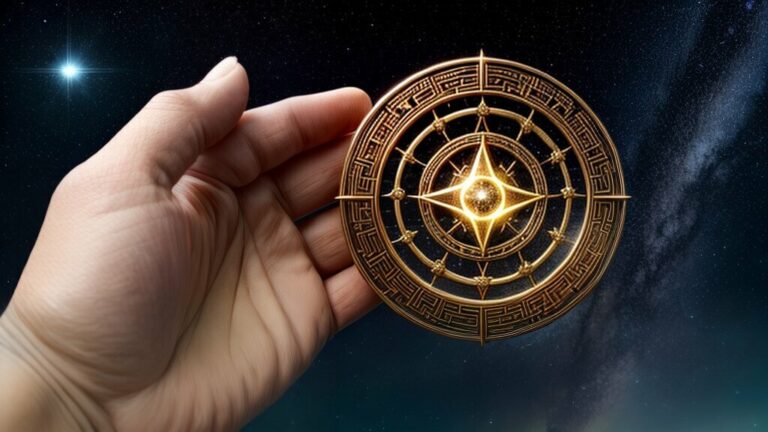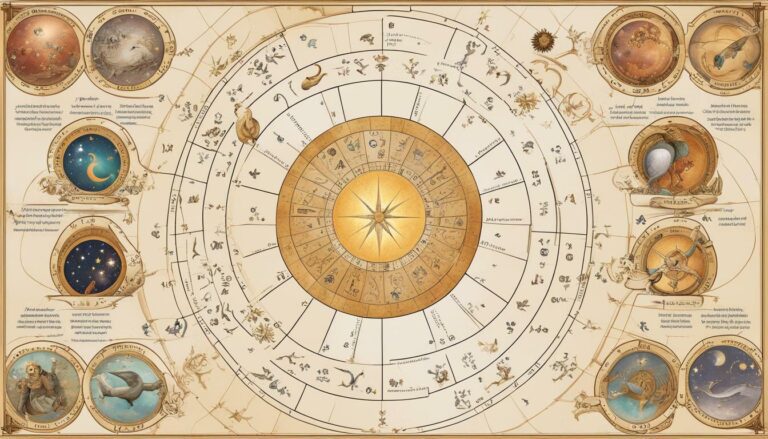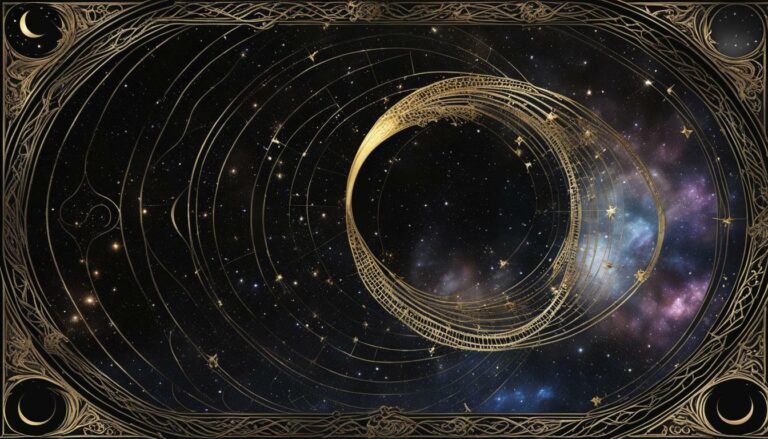Where Did Astrology Signs Come From: Origin & History Explored
Have you ever wondered where astrology signs come from and how they came to be associated with human personality traits? In this article, we will explore the origins and historical background of astrology signs, tracing their evolution from ancient times to the present day.
Astrology is an ancient practice that dates back to prehistoric times, with early civilizations looking to the heavens for guidance and insight into human affairs. Over time, astrology developed into a complex system of beliefs and practices, with each culture and period adding its own unique contributions to the astrological canon.
Key Takeaways
- The origins of astrology signs can be traced back to prehistoric times, with the practice evolving over the centuries.
- Astrology has been influenced by a variety of ancient cultures, including Mesopotamia, Egypt, and Greece.
- Astrology signs are linked to the zodiac and their connection to the celestial bodies.
- Astrology signs continue to be relevant and popular in modern times, with a variety of interpretations and meanings.
Ancient Origins of Astrology Signs
Have you ever wondered where your astrology sign comes from? The origin of astrology signs dates back to ancient times when humans looked to the stars for guidance and meaning.
Astrology signs were first documented in Mesopotamia around 2000 BCE. Astronomers observed how the movements of celestial bodies influenced events on Earth and began developing astrological systems based on these observations.
The ancient Egyptians also developed an astrological system, associating specific constellations with their gods and goddesses. They believed that the arrangement of the stars at the time of a person’s birth could reveal their destiny and personality traits.
Ancient Greek Contributions to Astrology Signs
The ancient Greeks also made significant contributions to the development of astrology signs. They mapped the constellations and developed the concept of the zodiac, dividing the sky into twelve equal parts and assigning specific constellations to each part.
Astrology signs were initially linked to the movement of the sun through the twelve constellations of the zodiac. Individuals born under each constellation were believed to possess specific personality traits associated with the symbolism of the particular constellation.
As astrology spread throughout the world, different cultures added their own interpretations and variations to the system, leading to the diverse range of astrology signs we have today.
| Ancient Origins of Astrology Signs | Major Contributions to Astrology Signs |
|---|---|
| Mesopotamia – 2000 BCE | The Greeks – Developed the zodiac |
| Egyptians – Associated constellations with gods and goddesses |
Although modern science has yet to prove the validity of astrology, the ancient origins and rich cultural history associated with astrology signs continue to fascinate people today.
The Influence of Ancient Cultures on Astrology Signs
The birth of astrology signs can be traced back to ancient civilizations like Mesopotamia, Egypt, and Greece. These cultures observed the movements of celestial bodies and for them, the regular patterns in the sky held great importance.
One of the earliest forms of astrology can be found in Mesopotamia, where priests studied the movements of planets and stars to predict future events. The Babylonians later adopted this practice, creating the zodiac we use today.
In Egypt, astrology played a significant role in religious and cultural practices. The Egyptians believed that the position of the stars held great importance in predicting the future and determining an individual’s destiny.
Greek philosophers, like Plato and Aristotle, also contributed to the evolution of astrology signs. They believed that the alignment of celestial bodies influenced human behavior and personality traits, leading to the development of the concept of horoscopes.
These ancient cultures paved the way for astrology signs to become a significant part of human history and culture. Even today, we continue to use these ancient symbols to decipher our place in the universe and understand our inner selves.
The Zodiac and Celestial Origins of Astrology Signs
Have you ever wondered how astrology signs are linked to the zodiac and the celestial bodies? Let’s explore this fascinating connection.
The zodiac is a band of the sky, divided into twelve distinct sections, with each section representing a different constellation. These constellations were named after various animals and symbols, and it is from here that the names of the astrology signs were derived.
Each astrology sign is linked to a particular planet, and its unique set of personality traits is said to be influenced by the characteristics associated with that planet. For example, Aries is linked to Mars, which is known for its energy, drive and determination.
| Astrology Sign | Linked Planet |
|---|---|
| Aries | Mars |
| Taurus | Venus |
| Gemini | Mercury |
| Cancer | Moon |
| Leo | Sun |
| Virgo | Mercury |
| Libra | Venus |
| Scorpio | Pluto & Mars |
| Sagittarius | Jupiter |
| Capricorn | Saturn |
| Aquarius | Uranus |
| Pisces | Neptune |
Furthermore, each astrology sign is associated with a particular element – earth, air, fire or water – which governs its personality traits. For example, fire signs like Aries, Leo, and Sagittarius are known for their passion and enthusiasm, while earth signs like Taurus, Virgo, and Capricorn have a more practical and grounded nature.
It is believed that the alignment and positioning of the celestial bodies during a person’s birth can influence their personality traits, as well as their strengths and weaknesses.
The Impact of the Zodiac on Astrology Signs
While the zodiac may seem like a relatively modern concept, it has its roots in ancient astronomy and astrology. The Babylonians are credited with forming the first zodiac around 400 BCE, and their system was later adapted and expanded upon by the Greeks and Romans.
Today, the zodiac is an integral part of astrology, and the symbolism and associations between the stars, planets, and astrology signs continue to fascinate people all around the world.
The Evolution of Astrology Signs over Time
Astrology signs have undergone significant changes and evolution throughout history. The interpretations of astrological signs have varied depending on different cultures, beliefs, and practices. Here are some examples of the evolution of astrology signs:
- In ancient Mesopotamia, astrology was used to predict future events and was closely tied to religion. The horoscope was divided into twelve equal parts, each corresponding to a constellation, and was used to determine the fate of individuals.
- In ancient Egypt, astrology was also closely tied to religion and was used to predict outcomes of battles and other events. The Egyptians used a calendar based on the cycles of the moon combined with the movement of the sun and stars.
- In ancient Greece, astrology became more complex and intricate. The Greeks believed that the movements of the planets and stars were connected to human personality traits and fate. The zodiac, a circle of twelve equal parts, each corresponding to a constellation, was created during this time.
As time went on, astrology continued to evolve and adapt to different beliefs and practices. During the Renaissance, astrology became more focused on individual personality and character traits, rather than just predicting future events. In the 20th century, astrology became mainstream and is now widely used in horoscopes and personality assessments.
Despite the evolving interpretations and meanings of astrology signs, they continue to be popular and relevant today. Their evolution over time highlights the importance of adaptability and flexibility in astrology, as well as the enduring human desire to understand and make sense of the world around us.
Astrology Signs in Modern Times
Today, astrology signs continue to hold a significant place in popular culture and society. Whether you’re scrolling through social media or flipping through a magazine, you’re likely to come across horoscopes, personality assessments, and compatibility analyses based on astrology signs.
You may have even consulted an astrologer for guidance, seeking insight into your future or your relationship with others based on the alignment of celestial bodies at the time of your birth.
The presence of astrology signs in modern times can be attributed to their adaptability and relevance to a wide range of belief systems and cultural practices. Astrology signs have been incorporated into everything from fashion trends to political discourse, often serving as a shorthand way to express complex personality traits and interpersonal dynamics.
Despite their continued popularity, astrology signs have also faced criticism and skepticism from those who view them as pseudoscience or superstition. Scientific interpretations of astrology signs have not been able to provide concrete evidence for their validity, leading some to question their overall accuracy and significance.
However, for many people, astrology signs remain a deeply meaningful and personal aspect of their identity and worldview. Whether you view astrology signs as a source of entertainment, guidance, or self-awareness, they continue to hold a unique place in contemporary culture.
Scientific Criticism and Interpretation of Astrology Signs
If you’re someone who puts a lot of faith in astrology signs and their meanings, you may not want to hear what the scientific community has to say. While astrology has gained popularity in recent years, it’s important to note that it doesn’t have a place in scientific research or evidence-based knowledge.
Scientists argue that astrology signs and their interpretations lack empirical evidence and sound reasoning, making them nothing more than superstition. They say there is no correlation between the planetary movements and human behavior, and that astrology signs are simply vague and general enough that they can apply to anyone.
That being said, there are many different interpretations of astrology signs and their meanings. Some people view them as a way to gain insight into their own personality traits, while others use them to understand their compatibility with others. Regardless of what you believe, it’s important to approach astrology signs with a critical and skeptical eye, and to recognize that they may not hold up under scientific scrutiny.
Cultural Significance of Astrology Signs Today
As we have seen, astrology signs have a rich and varied history, with roots in ancient cultures and the study of celestial bodies. But what about their significance in modern times?
Today, astrology signs continue to be popular and relevant, with millions of people around the world checking their horoscopes and seeking insights into their personalities and relationships.
But beyond individual interest, astrology signs have also had a significant impact on popular culture, influencing everything from music and art to fashion and home decor.
“Astrology is a language. If you understand this language, the sky speaks to you.” – Dane Rudhyar
Many people also see astrology signs as a way to connect with something larger than themselves, whether it be the universe, a higher power, or simply a shared belief system.
However, it is important to note that astrology signs have also faced criticism and skepticism, with some arguing that they lack scientific validity and are merely based on vague generalizations. Nonetheless, their cultural and personal significance cannot be denied.
Conclusion
Congratulations! You’ve learned about the fascinating origins and history of astrology signs. From their ancient roots in Mesopotamia and Egypt to their evolution and adaptation throughout different cultures, astrology signs have played a significant role in human society.
Today, astrology signs continue to be relevant and popular, with horoscopes and personality assessments being widely used. However, there are also scientific criticisms and varying interpretations of their meanings.
Despite this, astrology signs continue to hold cultural significance and impact, influencing fashion, art, and popular culture.
So, whether you’re a skeptic or a believer, the history of astrology signs proves that they have been a part of human culture for centuries and will continue to captivate and intrigue us for years to come.
FAQ
Q: Where did astrology signs come from?
A: Astrology signs have their origins in ancient cultures and have evolved over time to become a significant part of modern astrology.
Q: What is the history of astrology signs?
A: The history of astrology signs dates back to ancient times, with influences from civilizations like Mesopotamia, Egypt, and Greece shaping their development and interpretation.
Q: How are astrology signs linked to the zodiac and celestial bodies?
A: Astrology signs are closely tied to the zodiac, which is based on the positioning of celestial bodies like the sun, moon, and planets. Each sign is associated with specific characteristics based on these celestial alignments.
Q: How have astrology signs evolved over time?
A: Astrology signs have adapted and changed throughout history, influenced by cultural beliefs and practices. They have evolved to reflect the beliefs and values of different time periods.
Q: Are astrology signs still relevant in modern times?
A: Astrology signs continue to be popular and relevant in modern society, with horoscopes, personality assessments, and compatibility analyses incorporating their meanings and interpretations.
Q: How is astrology signs viewed scientifically?
A: There is scientific criticism surrounding astrology signs, with varying interpretations of their validity and meaning. Some view them as pseudoscience, while others find value in their symbolism.
Q: What is the cultural significance of astrology signs today?
A: Astrology signs have a cultural impact and are often seen in popular culture, art, and fashion. They play a role in self-expression and personal identity for many individuals.
Q: What is the conclusion about the origin and history of astrology signs?
A: The origin and history of astrology signs can be traced back to ancient civilizations, and they have evolved and adapted to become a meaningful part of modern astrology and popular culture.






